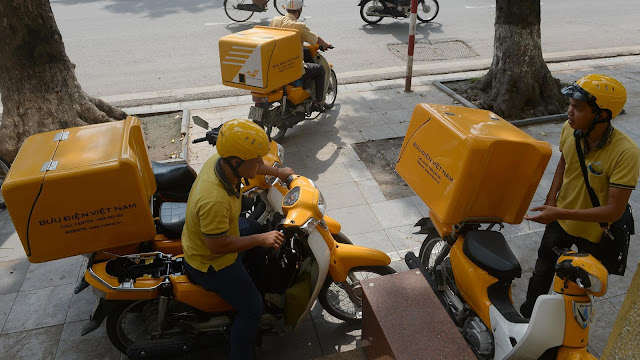WHY YOU SHOULD CARE
The internet is changing Vietnam, and the spending patterns of its citizens.
The internet is changing Vietnam, and the spending patterns of its citizens.
Tran Ngoc Thai Son set up his e-commerce startup in his parents’ bedroom in Ho Chi Minh City, and went live one Saturday morning in 2010. The first order came on the Monday, when Son prodded a friend to order a book, which he delivered himself on a motorbike.
Eight years later, Tiki.vn has expanded from its original niche of English-language books to goods ranging from diapers and electronics to air tickets and insurance. The company has annualized gross merchandise value — an indicator by which e-commerce sites measure their sales — of about $240 million, and delivers across Vietnam.
“Vietnam is a very young country going through a golden population period,” says Son, referring to Vietnam’s demographics, which skew heavily toward younger people. “We are a working and shopping country.”
SOURCE FINANCIAL TIMES
He says Tiki had an opportunity to go public within four years, and that the company was looking at expanding in the region, possibly starting with Taiwan.
Tiki.vn is one of several e-commerce companies, many with foreign backers, homing in on Vietnam, where rising incomes and growing internet connectivity rates are pushing more shoppers online. Amazon last month attended an industry conference in Vietnam, prompting speculation among retailers — and some consumers who use the U.S. site and pay steep shipping fees and import taxes — that it would be entering the country soon. The company did not respond to a request for comment on its plans for the market.
For now, the competition is largely a proxy war between China’s e-commerce companies. Lazada, owned by Alibaba, is the market leader, while JD.com recently bought a 22 percent stake in Tiki for an undisclosed amount. Online marketplace Shopee is owned by Singapore-based Sea, in which China’s Tencent is a shareholder.
E-commerce has been slower to take off in Southeast Asia than in China because of the region’s challenging logistics. However, online businesses are booming: Bain, the consultancy, recently estimated that the region had 200 million digital consumers — people who bought goods or services online — out of an adult population of 405 million. Vietnam accounted for 35 million of those.
Vietnam’s youthful population are among the keenest users of mobile devices in the region, while the country’s consumers spend more time online than most of their neighbors. Nielsen, the market research firm, estimated that people spend nearly 25 hours online per week, on par with or just behind Singapore and the Philippines.
SOURCE FINANCIAL TIMES
However, Vietnam poses a special challenge for the delivery market, e-commerce groups say, because of poor roads, growing traffic congestion and its sprawling geography — its two biggest cities, Hanoi and Ho Chi Minh City, lie more than 1,600 km (994 miles) apart.
“The challenge for commerce in Southeast Asia in general, and Vietnam in particular, is logistics,” says Vu Duc Thinh, country manager for the logistics arm of Lazada, which is piloting the use of bicycles and electric tricycles in Vietnam and other Southeast Asian countries where it operates.
E-commerce companies also have to contend with stiff competition from brick-and-mortar shopping, which is enjoying a surge of investment and rising sales amid a sustained economic boom in which gross domestic product is growing more than 7 percent a year.
Vietnamese consumers are notoriously price sensitive, posing an added challenge in determining prices and shipping fees. Huynh Mai, who is 25 and works for an advertising agency in Ho Chi Minh City, is one of the new online shoppers that retailers covet. Mai has graduated from paying cash on delivery to using her Visa card. She usually goes online to buy cosmetics, clothes and appliances, and recently bought an Electrolux washing machine on Lazada for her family.
She buys books on Tiki, and is intrigued by rumors that Amazon could come to Vietnam. Mai sometimes buys goods from the U.S. site through a friend who lives there, paying the extra money needed to get the goods to Vietnam. “If Amazon comes here, it would be really amazing,” says Mai. “But the challenge would be the price of the products. I think if they want to win Vietnamese customers, they have to come with the best price.”
This Post Original From : https://www.ozy.com/fast-forward/communist-vietnam-turns-to-e-commerce/86453



Comments
Post a Comment